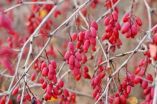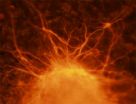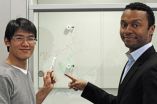(Press-News.org) This news release is available in German.
Leipzig. Plants are also able to make complex decisions. At least this is what scientists from the Helmholtz Center for Environmental Research (UFZ) and the University of Göttingen have concluded from their investigations on Barberry (Berberis vulgaris), which is able to abort its own seeds to prevent parasite infestation. The results are the first ecological evidence of complex behaviour in plants. They indicate that this species has a structural memory, is able to differentiate between inner and outer conditions as well as anticipate future risks, scientists write in the renowned journal American Naturalist — the premier peer-reviewed American journal for theoretical ecology.
The European barberry or simply Barberry (Berberis vulgaris) is a species of shrub distributed throughout Europe. It is related to the Oregon grape (Mahonia aquifolium) that is native to North America and that has been spreading through Europe for years. Scientists compared both species to find a marked difference in parasite infestation: "a highly specialized species of tephritid fruit fly, whose larvae actually feed on the seeds of the native Barberry, was found to have a tenfold higher population density on its new host plant, the Oregon grape", reports Dr. Harald Auge, a biologist at the UFZ.
This led scientists to examine the seeds of the Barberry more closely. Approximately 2000 berries were collected from different regions of Germany, examined for signs of piercing and then cut open to examine any infestation by the larvae of the tephritid fruit fly (Rhagoletis meigenii). This parasite punctures the berries in order to lay its eggs inside them. If the larva is able to develop, it will often feed on all of the seeds in the berry. A special characteristic of the Barberry is that each berry usually has two seeds and that the plant is able to stop the development of its seeds in order to save its resources. This mechanism is also employed to defend it from the tephritid fruit fly. If a seed is infested with the parasite, later on the developing larva will feed on both seeds. If however the plant aborts the infested seed, then the parasite in that seed will also die and the second seed in the berry is saved.
When analysing the seeds, the scientists came across a surprising discovery: "the seeds of the infested fruits are not always aborted, but rather it depends on how many seeds there are in the berries", explains Dr. Katrin M. Meyer, who analysed the data at the UFZ and currently works at the University of Goettingen. If the infested fruit contains two seeds, then in 75 per cent of cases, the plants will abort the infested seeds, in order to save the second intact seed. If however the infested fruit only contains one seed, then the plant will only abort the infested seed in 5 per cent of cases. The data from fieldwork were put into a computer model which resulted in a conclusive picture. Using computer model calculations, scientists were able to demonstrate how those plants subjected to stress from parasite infestation reacted very differently from those without stress. "If the Barberry aborts a fruit with only one infested seed, then the entire fruit would be lost. Instead it appears to 'speculate' that the larva could die naturally, which is a possibility. Slight chances are better than none at all", explains Dr. Hans-Hermann Thulke from the UFZ. "This anticipative behaviour, whereby anticipated losses and outer conditions are weighed up, very much surprised us. The message of our study is therefore that plant intelligence is entering the realms of ecological possibility."
But how does the Barberry know what is in store for it after the tephritid fruit fly has punctured a berry? It is still unclear as to how the plant processes information and how this complex behaviour was able to develop over the course of evolution. The Oregon grape that is closely related to the Barberry has been living in Europe for some 200 years with the risk of being infested by the tephritid fruit fly and yet it has not developed any such comparable defence strategy. These new insights shed some light on the underestimated abilities of plants, while at the same time bringing up many new questions. INFORMATION:
Tilo Arnhold
Publication:
Katrin M. Meyer, Leo L. Soldaat, Harald Auge, Hans-Hermann Thulke (2014): Adaptive and selective seed abortion reveals complex conditional decision making in plants. The American Naturalist. Vol. 183, No. 3, March 2014
http://www.amnat.org/an/newpapers.html
http://www.press.uchicago.edu/ucp/journals/journal/an.html
Further information:
Helmholtz Centre for Environmental Research (UFZ)
Dr. Hans-Hermann Thulke
Phone: +49-(0)341-235-1712
http://www.ufz.de/index.php?en=3896
and
Dr. Harald Auge
Phone: +49-(0)345-558-5309
http://www.ufz.de/index.php?en=1153
and
Georg-August-Universität Göttingen
Dr. Katrin M. Meyer
Phone: +49-(0)551-39-33795
http://www.uni-goettingen.de/de/112108.html
or via
Tilo Arnhold, Susanne Hufe (UFZ press office)
phone: +49-(0)341-235-1635, -1630
http://www.ufz.de/index.php?en=640
Links:
Why invasive species have an advantage over established native ones. (Press release from May 27th, 2008)
Berberis vulgaris
Are plants more intelligent than we assumed?
In the fight against parasites, the Barberry sacrifices its own seeds depending upon its chances of survival
2014-03-05
ELSE PRESS RELEASES FROM THIS DATE:
Hot on the trail of cellular metabolism
2014-03-05
UCPs or uncoupling proteins are present in mitochondria, the powerhouse of each cell in the body. The functions of most of the five known UCPs remain mysterious (UCP2-UCP5), whereby only the distinct function for UCP1 has thus far been discovered. UCP1 is responsible for heat production when muscle activity is deficient such as is the case with babies and animals in hibernation. The research team at the Department of Physiology and Biophysics at the University of Veterinary Medicine in Vienna were able to provide a fundamental explanatory concept for the function of UCP2 ...
Study shows nearly fivefold increased risk for heart attack after angry outburst
2014-03-05
BOSTON – Call it what you will – getting red in the face, hot under the collar, losing your cool, blowing your top – we all experience anger. And while we know that anger is a normal, sometimes even beneficial emotion, we're also aware of the often harmful connection between anger and health. New research from Beth Israel Deaconess Medical shows an even more compelling reason to think about getting anger in check – a nearly fivefold increase in risk for heart attack in the two hours following outbursts of anger.
"There has been a lot of research on anger; we already ...
Not even freezing cold stops alien species in high altitudes
2014-03-05
They hitchhike with us under the soles of our shoes and muddy car tires. Harsh and cold climates do not seem to stop alien plants from establishing themselves in high altitudes, where they now successfully penetrate the alpine vegetation, according to a study at Umeå University in Sweden and the University of Antwerp, Netherlands.
"Alien plants often gain advantages in their new environment because they lack natural enemies, and in this case the lack of strong competitors amongst alpine plants may be the key to success for generalist native species," says ecologist Ann ...
Horses set to gain health benefits from stem cell advance
2014-03-05
Horses suffering from neurological conditions similar to those that affect humans could be helped by a breakthrough from stem cell scientists.
Researchers who are the first to create working nerve cells from horse stem cells say the advance may pave the way for cell therapies that target conditions similar to motor neurone disease.
The research could also benefit horses affected by grass sickness, a neurological condition that affects around 600 horses a year in the UK.
Little is known about the disease, which causes nerve damage throughout the body. It is untreatable ...
Women's jobs are poorer paid, less flexible and more stressful
2014-03-05
Women's jobs are poorer paid, less flexible, more stressful, and offer fewer promotion opportunities than men's, a large international study has found.
Researchers say that the results disprove the theory that women have voluntarily traded less high-powered jobs in order to have more flexibility for their responsibilities at home.
Professor Haya Stier, of Tel Aviv University, and Professor Meir Yaish, University of Haifa, analysed survey data on the working lives of 8,500 men and 9,000 women in 27 industrialised countries, including the UK.
In a paper published ...
New: An environmentally friendly chemical reaction that does not waste any atoms
2014-03-05
This news release is available in German.
In the Research Group of Nuno Maulide, a chemist working at the University of Vienna, a new chemical synthesis for α-arylated Carbonyl derivatives was developed. Members of this class of substances typically possess interesting biological and pharmacological properties and often find applications as medicines. The new technique developed by the Maulide group, which allows such Carbonyl derivatives to be generated easily, efficiently and in an environmentally friendly manner – without wasting any atoms –, has raised ...
Suicidal ideation among US soldiers begins before enlistment
2014-03-05
Nearly 60% of soldier suicide attempts can be traced to pre-enlistment mental disorders, which are much more common among nondeployed U.S. Army soldiers than demographically similar populations of civilians (25.1% vs. 11.6%), according to a major new study. The vast majority (76.6%) of soldiers with mental disorders say their conditions started before enlistment, researchers found.
These are among the initial results published online today in JAMA Psychiatry based on a survey carried out as part of the Army Study to Assess Risk and Resilience in Servicemembers (Army STARRS), ...
Plant extract offers hope for infant motor neuron therapy
2014-03-05
A chemical found in plants could reduce the symptoms of a rare muscle disease that leaves children with little or no control of their movements.
Scientists have found that a plant pigment called quercetin – found in some fruits, vegetables, herbs and grains – could help to prevent the damage to nerves associated with the childhood form of motor neuron disease.
Their findings could pave the way for new treatments for spinal muscular atrophy (SMA) – also known as floppy baby syndrome – which is a leading genetic cause of death in children.
The team has found that the ...
Study comparing injectable contraceptives DMPA and NET-EN finds HIV risk higher with DMPA
2014-03-04
BOSTON, March 4, 2014 – Women who used an injectable contraceptive called DMPA were more likely to acquire HIV than women using a similar product called NET-EN, according to a secondary analysis of data from a large HIV prevention trial called VOICE, researchers from the National Institutes of Health-funded Microbicide Trials Network (MTN) reported today at the 21st Conference on Retroviruses and Opportunistic Infections (CROI) in Boston.
An unexpected finding in the study was that the combination of being positive for herpes simplex virus type 2 (HSV-2) and using DMPA ...
Raising an army of armchair activists?
2014-03-04
Social media may fuel unprecedented civic engagement. Digital networks might make possible mass protest and revolution – think "Arab Spring." But sometimes and maybe even most of the time, a new study suggests, the accomplishments of online activism are much more modest.
Published in Sociological Science, the paper was co-authored by Kevin Lewis, of the University of California, San Diego's department of sociology, with Kurt Gray, department of psychology at the University of North Carolina, Chapel Hill, and Jens Meierhenrich, department of international relations, London ...
LAST 30 PRESS RELEASES:
Alkali cation effects in electrochemical carbon dioxide reduction
Test platforms for charging wireless cars now fit on a bench
$3 million NIH grant funds national study of Medicare Advantage’s benefit expansion into social supports
Amplified Sciences achieves CAP accreditation for cutting-edge diagnostic lab
Fred Hutch announces 12 recipients of the annual Harold M. Weintraub Graduate Student Award
Native forest litter helps rebuild soil life in post-mining landscapes
Mountain soils in arid regions may emit more greenhouse gas as climate shifts, new study finds
Pairing biochar with other soil amendments could unlock stronger gains in soil health
Why do we get a skip in our step when we’re happy? Thank dopamine
UC Irvine scientists uncover cellular mechanism behind muscle repair
Platform to map living brain noninvasively takes next big step
Stress-testing the Cascadia Subduction Zone reveals variability that could impact how earthquakes spread
We may be underestimating the true carbon cost of northern wildfires
Blood test predicts which bladder cancer patients may safely skip surgery
Kennesaw State's Vijay Anand honored as National Academy of Inventors Senior Member
Recovery from whaling reveals the role of age in Humpback reproduction
Can the canny tick help prevent disease like MS and cancer?
Newcomer children show lower rates of emergency department use for non‑urgent conditions, study finds
Cognitive and neuropsychiatric function in former American football players
From trash to climate tech: rubber gloves find new life as carbon capturers materials
A step towards needed treatments for hantaviruses in new molecular map
Boys are more motivated, while girls are more compassionate?
Study identifies opposing roles for IL6 and IL6R in long-term mortality
AI accurately spots medical disorder from privacy-conscious hand images
Transient Pauli blocking for broadband ultrafast optical switching
Political polarization can spur CO2 emissions, stymie climate action
Researchers develop new strategy for improving inverted perovskite solar cells
Yes! The role of YAP and CTGF as potential therapeutic targets for preventing severe liver disease
Pancreatic cancer may begin hiding from the immune system earlier than we thought
Robotic wing inspired by nature delivers leap in underwater stability
[Press-News.org] Are plants more intelligent than we assumed?In the fight against parasites, the Barberry sacrifices its own seeds depending upon its chances of survival



